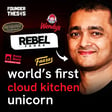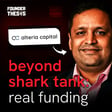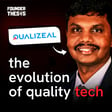
Building a ₹7500 Cr AUM Fintech | Harshvardhan Lunia (Lendingkart)
"The customer is the CEO of the company; he can fire everyone."
This core belief drove Harshvardhan Lunia's journey in building Lendingkart. He emphasizes that obsessively solving the customer's problem—be it the need for speed, transparency, or convenience—is the ultimate key to building trust and a successful financial services business.
Harshvardhan Lunia is the Founder & CEO of Lendingkart, a fintech platform transforming SME lending in India. An ISB graduate and Chartered Accountant, he leveraged his background in banking and SME credit advisory to launch Lendingkart in 2014. Lendingkart has since disbursed over ₹20,000 crores to more than 3 lakh customers across 4,500+ towns and cities in India, achieving a total AUM of ₹7,500 crores (with ₹5,500 crores via co-lending) by FY24.
Key Insights from the Conversation:
✅SME Lending Pain Points: Traditional lending for SMEs suffered from slow processes (3-4 months) and lack of transparency, creating a market gap. Lendingkart focused on speed (hours/days) and transparency from day one.
✅Data Over Tradition: Realizing traditional financial statements were often adjusted for tax purposes, Lendingkart pioneered using bank statement analysis and cash flow data for underwriting.
✅Tech-Driven Underwriting: The platform evolved from rule-based systems to sophisticated algorithms trained on billions of data points to assess risk and determine loan terms, achieving high predictive accuracy (97.5%).
✅The Rise of Co-Lending: Partnering with banks and larger institutions (co-lending) became crucial post-COVID, allowing Lendingkart to scale distribution while sharing risk and capital. By March 2022, 80% of business was co-lending, reaching a 25/75 (own books/co-lending) AUM split in FY24.
✅Distribution is Key: While underwriting and collections tech are vital, building trust and reaching customers across India (distribution) is the ultimate differentiator in the absence of a large legacy brand or branch network.
✅Fundraising Conviction: Raising capital involves storytelling and unwavering conviction in your vision, especially when building something new. It's an exam where you must clearly articulate why your approach will work. Harshvardhan even shared his unique approach of pitching using a whiteboard instead of presentations.
#Lendingkart #HarshvardhanLunia #FintechIndia #DigitalLending #SMEFinance #MSME #NBFC #StartupIndia #Entrepreneurship #IndianStartups #FounderThesis #BusinessPodcast #VCFunding #CoLending #DataAnalytics #Underwriting #FinancialInclusion



















